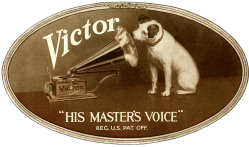The Victor-Victrola Page

How many turns of the crank should be made?
ANSWER: This depends on which model you have. Low-cost models with single-spring motors can often be wound with only a few turns, while the more expensive ones with 3 or 4-spring motors can require many turns (upwards of 50 revolutions) to fully wind. And Victor constantly changed the motor designs, including the winding-gear ratios. So there is no fixed rule on the appropriate number of turns required. If your Victrola is in original condition, and the motor has not been recently serviced, it is critical that you wind the crank very slowly and stop immediately if you begin to feel a lot of resistance. This is often due to hardened grease in-between the spring windings, and forcing the crank can seriously damage the motor. It is best to use a "trial and error" approach. Wind the crank slowly about 5-6 turns (which isn't very much) and stop. Release the brake and see if the turntable moves (you can give it a push to start). If the motor doesn't turn, continue winding another 5-6 turns until it begins to rotate. Then try to play a record. Most likely the motor will run-down long before the record is complete. You can wind the motor while the record is still playing, to bring it back up to speed. Then the next time you start out, wind the crank 10-12 turns, and see if you can play the record through without it slowing. Continue this process of gradually increasing the number of turns until you can play-through a complete record.
Unless your motor has been correctly rebuilt, we don't advise winding the motor like crazy until it hits the "stops". That is putting a lot of internal stress on the springs and gears, and if something breaks, you will have an expensive mess on your hands. Plus, the hard grease stuck to the springs is adding to the internal tension in the spring housings. Just wind it enough (using the procedure above) to play through a record completely. It will be common to hear a loud "thump" while the motor is playing. That indicates that the old grease is binding-up between the springs, and then when the tension is released as the springs continue to unwind, they will eventually overcome the grease-induced friction and snap back making a loud sound. While this may not harm the motor, it is best to get the springs lubricated to avoid future damage.
NEVER run a motor if you hear a loud "machine gun" popping, sound, or if the turntable spins at a frantic speed. This indicates that the speed governor has failed, and running the motor in that condition will certainly damage many components. The motor will need to be serviced.
If you plan on using your Victor or Victrola a lot, it is always best to get the motor overhauled. Then you can wind the motor to full tension (to hit the "stops") and play multiple records on one full winding. See our RESOURCES page for more information on motor and mechanical repairs.
For electric (VE) motors, it is best to have the motor and wiring serviced (or at least looked at by someone who knows what they are doing) as any loose wiring, damaged insulation, or a shorted motor winding can cause smoke and fire, as well as creating a potential for electrical shock. We never recommend powering-up early radios and/or electronic phonographs (e.g. 1924-1929 Electrolas and/or Radiolas) without having them checked-out first by a professional. Not only can severe internal damage occur due to shorts or other issues, we know of a few folks who have caused major house fires as a result.
PLEASE CLOSE THIS PAGE TO RETURN TO FAQ's or RETURN TO HOME PAGE VIA BUTTON ON TOP LEFT
